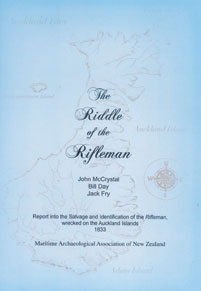Difference between revisions of "The Riddle of the Rifleman"
m |
|||
| (4 intermediate revisions by the same user not shown) | |||
| Line 8: | Line 8: | ||
ISBN 978-0-473-20126-5 | ISBN 978-0-473-20126-5 | ||
| − | The report is available from MAANZ - see | + | The report is available from MAANZ - see [http://www.maanz.wellington.net.nz/projects/repart.html here]. |
| Line 21: | Line 21: | ||
But what was she? Known until recently known as the “Half Crown Wreck”, extensive research has now revealed the identity of the ship." | But what was she? Known until recently known as the “Half Crown Wreck”, extensive research has now revealed the identity of the ship." | ||
| + | |||
| + | |||
| + | |||
| + | == Mini Review == | ||
| + | |||
| + | {| | ||
| + | |{{Pop}} | ||
| + | |} | ||
| + | |||
| + | The report is in three parts – an account of the discovery and recovery of the artefacts, an account of their conservation and lastly the investigation of shipping history that convincingly identifies the ship. The first is brief and chatty rather than a formal archaeological account. The circumstances of the discovery and later investigation in the course of searches for the treasure of the General Grant and the substantial cost and difficulty of working at the location no doubt dictated the methods applied and constrained the ability to make fuller records. Interesting, but not an exemplar of methodology. The conservation is an interesting account, frank about successes and failures. There is an inventory of finds and photographs – mostly without scales - of quite a few. Some drawings of others would have been welcome. | ||
| + | |||
| + | McCrystal’s historical investigation is the most gripping part of the publication – which exposes clearly the circumstances of navigation in the southern ocean in the 1830’s. Interestingly some flotsam found on Auckland Islands soon after had been identified as being from the missing Rifleman but over the years this had been forgotten. In all an account likely to be of interest to a general reader as much as a specialist. | ||
| + | |||
| + | [[Law Garry|GL]] | ||
[[Category:Books]][[Category:2012_Books]][[Category:Maritime]][[Category:Auckland Islands]] | [[Category:Books]][[Category:2012_Books]][[Category:Maritime]][[Category:Auckland Islands]] | ||
| + | [[Category:Reviews]] | ||
Latest revision as of 18:34, 25 August 2012
The Riddle of the Rifleman
Report into the Salvage and Identification of the Rifleman wrecked in the Auckland Islands 1833John McCrystal, Bill Day and Jack Fry, 2012. Maritime Archaeological Association of New Zealand
ISBN 978-0-473-20126-5
The report is available from MAANZ - see here.
Blurb
"Unidentified Wreck on the Auckland Islands
In January 1986 a group of divers from New Zealand looking for the wreck of the General Grant found the wreck of an unknown sailing ship on the West Coast of the Auckland Islands. In a subsequent expedition over 1995-1996, they found and retrieved an intriguing number of artefacts. These included three anchors, two cannon with numerous cannonballs, 60 half crowns and two copper coins dated between 1810 and 1833. A number of gold coins were also retrieved. Names on the ships fittings indicated that it was a wreck of a British built vessel.
But what was she? Known until recently known as the “Half Crown Wreck”, extensive research has now revealed the identity of the ship."
Mini Review
This is a POP page.
|
The report is in three parts – an account of the discovery and recovery of the artefacts, an account of their conservation and lastly the investigation of shipping history that convincingly identifies the ship. The first is brief and chatty rather than a formal archaeological account. The circumstances of the discovery and later investigation in the course of searches for the treasure of the General Grant and the substantial cost and difficulty of working at the location no doubt dictated the methods applied and constrained the ability to make fuller records. Interesting, but not an exemplar of methodology. The conservation is an interesting account, frank about successes and failures. There is an inventory of finds and photographs – mostly without scales - of quite a few. Some drawings of others would have been welcome.
McCrystal’s historical investigation is the most gripping part of the publication – which exposes clearly the circumstances of navigation in the southern ocean in the 1830’s. Interestingly some flotsam found on Auckland Islands soon after had been identified as being from the missing Rifleman but over the years this had been forgotten. In all an account likely to be of interest to a general reader as much as a specialist.
